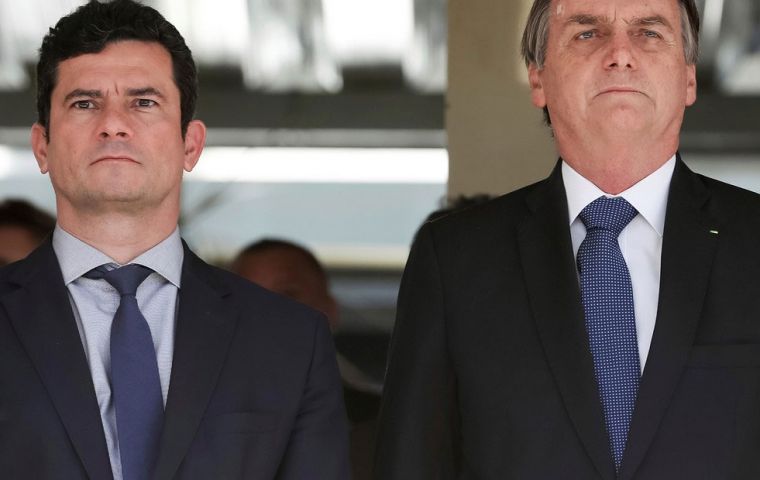MercoPress. South Atlantic News Agency
Sergio Moro's ruling on Lula was biased, says Brazil's Supreme Court
 Moro accepted Bolsonaro's offer to become Justice Ministr, thus demonstrating his partiality towards The PT leader.
Moro accepted Bolsonaro's offer to become Justice Ministr, thus demonstrating his partiality towards The PT leader. In a 3-2 split ruling, Brazil's Supreme Court Tuesday determined that Judge Sergio Moro's sentencing of former President Luiz Inácio Lula Da Silva (2003-2011) on corruption charges in the Lava Jate case was biased.
This decision might have an avalanche effect on all those others sent to jail by the same judge who would later become Jair Bolsonaro's Justice Minister.
With voting tied at 2, Justice Carmen Lúcia was the last to cast her decision which came as a surprise to many given her 2018 ruling supporting Moro, whose accepting Bolsonaro's offer to become Justice Minister was deemed enough proof of his political animosity towards Lula.
The Supreme Federal Court of Brazil (STF) then decided that all decisions made by Moro in the case of the Guarujá triplex, “including the facts practiced in the pre-trial phase” were null because the magistrate “showed partiality in his conduct.“
Lula had been convicted of receiving an apartment as a bribe from the construction company OAS. In the light of this new ruling, the entire process now goes back to square one at a federal court in Brasilia.
Although it was a decision limited to the triplex case, Moro's partiality will lead to the complete annulment of all corruption proceedings against the PT leader, according to law scholars, and lead to the invalidation of sentences imposed on other defendants.
The STF explained that ”the defense sought the annulment of the criminal action“ because ”Moro received and accepted the invitation of the elected president Jair Bolsonaro to assume the Ministry of Justice (...) thus demonstrating his partiality towards the former president and reveals that he would have acted throughout the process with political motivation.”
Meanwhile, the Lula Institute said in a statement drafted by the former president's legal team that “recognizing Moro's bias has strengthened the justice system in Brazil.”
“The decision that the II Panel of the Supreme Federal Court will issue today is historic and invigorating for the rule of law and the due legal process,” the statement went on. “We hope that the judgment passed today by the Supreme Court will serve as a guide” for the future.
Lúcia stressed that between the first vote and Tuesday's there were elements that changed the scene. Messages leaked by hackers in 2019 and published by the site The Intercept showed how Moro allegedly coordinated the accusation in messages with the prosecutors leading to a guilty verdict for corruption and money laundering. Lúcia was joined in her decision by Justicies Gilmar Mendes and Ricardo Lewandowski.
“Everyone has the right to a fair trial and due process of law and the impartiality of the judge,” said Lúcia when casting her vote. She was well aware a cascade effect on other cases might ensue, so she was quick to underline that her ruling was limited to Lula and the case of the Guarujá triplex. “The vote says nothing about other cases conducted by the same judge. The partiality corresponds to a singular situation about a person, in this case, Luiz Inacio Lula da Silva,” the Supreme Court justice said.
The resumption of the analysis of Moro's bias came two weeks after the corruption convictions against Lula were overturned by Judge Edson Fachin, allowing the PT leader to regain his political rights, enabling him to run for office in 2022. Fachin's decision had been interpreted as a maneuver to omit the discussion about Moro's bias to preserve the operation.
With Moro's bias established, all pending charges against Lula are now expected to be dropped, according to law scholars. The decision also deals a severe blow to President Bolsonaro, whose political campaign had been mounted on an anti-corruption diatribe and the Lava Jato Scandal which seems to be heading for oblivion. “I ended the Lava Jato because there is no more corruption in the government,” Bolsonaro had boasted in October last year.
This judicial ruling also dented Moro's personal hopes of running for the presidency next year, although he still has a 45% positive image according to unofficial polls.




Top Comments
Disclaimer & comment rules-

Read all commentsHmmm the silence is deafening, silence is acquiescence. So everything I stated was borne out.
Mar 30th, 2021 - 09:05 am -1https://en.wikipedia.org/wiki/Acquiescence
Commenting for this story is now closed.
If you have a Facebook account, become a fan and comment on our Facebook Page!